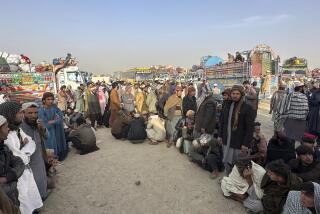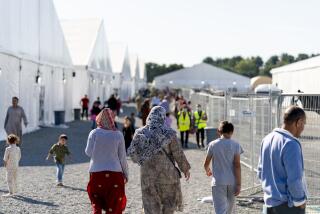A year into Ashraf Ghani’s presidency, many Afghans ready to give up
- Share via
Reporting from Kabul, Afghanistan — The last time Faisal, 19, stood in a line of hundreds in western Kabul, it was to vote in the second round of Afghanistan’s 2014 presidential election.
Faisal, who works at a tailoring shop, said he cast his ballot for President Ashraf Ghani, even though he was there as an observer for the rival candidate. At the time, Faisal was confident that Ghani was the right choice.
“He had a plan for everything,” said Faisal, who, like others interviewed for this story, gave only his first name.
A year later, Faisal said he regrets having voted. The lines he now stands in are at the Central Passport Department, where he and hundreds of Afghans wait each day in the hope of obtaining documents that will eventually let them leave their homeland.
The crowds outside the passport office — which have numbered in the thousands on some recent days, according to media reports — are a sign of a growing lack of faith among Afghans in the internationally brokered national unity government led by Ghani.
After charges of widespread election fraud, the United States helped broker the compromise last September under which Ghani was inaugurated Sept. 29 and the runner-up, Abdullah Abdullah, took the new post of chief executive.
Beset by accusations of infighting among the rival camps and a lack of clarity on Abdullah’s powers, the government has failed to make progress in ending the conflict with Taliban-led insurgents or in boosting the economy, which took a huge dive during the drawn-out, 10-month-long election process.
“They’ve shown they can’t stand by their words,” Faisal said.
Many Afghans — particularly young men from the country’s south and east, where the conflict has been deadliest — have joined the throngs of migrants and refugees making the perilous journey to Europe.
In the last few months, thousands in Kabul have lined up outside the main passport office and the embassies of Iran, Pakistan and Turkey, seeking visas. Many have also queued outside passport bureaus in Jalalabad and Herat, two major cities that, like Kabul, are relatively safe.
Reza, who like many Afghans goes by a single name, is one of dozens who set up stands outside the Kabul passport office to help applicants prepare documents and get photographs. Voicing concern about the economy, Reza, 19, said his father’s roadside stand selling food and drinks used to take in as much as 5,000 Afghanis, or about $90, each day. Now, he said, “he is lucky” if he makes as much as one-tenth that amount.
Others said the scene at the passport office underscored a lack of progress on fighting corruption, much of it related to land disputes, a cornerstone of both Ghani’s and Abdullah’s election campaigns.
“People come and pay $1,000 bribes to commission agents and police while the rest of us wait for weeks at a time for even a simple document,” Abdul Basir, from the western province of Herat, said after a policeman pushed him out of line.
Former President Hamid Karzai, who retains political support, has criticized the government from the sidelines, particularly Ghani’s outreach to neighboring Pakistan, which has failed to yield progress in bringing Pakistan-based insurgents into peace negotiations.
“There is increasing insecurity and unemployment, which are leading to an economic crisis,” said Karzai’s longtime spokesman, Aimal Faizi. “There is a clearly divided government that has been split among two rival camps and as such, the authority of the Afghan president, more than ever before, is very limited and in rapid decline.”
Government officials say progress has been made. They point to the signing of a bilateral security agreement with the United States, which has allowed for thousands of U.S. troops to remain in Afghanistan training and advising national security forces. They also cite the prison terms handed to two former officials of Kabul Bank, the collapse of which in 2010 nearly destroyed Afghanistan’s financial sector.
Javid Faisal, a spokesman for Abdullah, said Afghan security forces have made gains against insurgents, despite predictions that they would collapse after most international troops withdrew from the country.
Although Afghanistan’s relations with Western allies became strained under Karzai, the new government “was able to rehabilitate the relations with the world and become a trusted partner for the international community,” he said.
Many Afghans say such claims are a case of too little, too late. Though Faisal concedes that Kabul is still relatively safe in comparison to much of Afghanistan, the tailoring shop employee said he has little incentive to remain.
The United Nations said August was the deadliest month for civilians in the capital in several years, with more than 300 people killed or injured in attacks.
“Even if there is security in Kabul, there is no still no economy,” he said. “How can any of us be expected to build a life here?”
Latifi is a special correspondent.
More to Read
Sign up for Essential California
The most important California stories and recommendations in your inbox every morning.
You may occasionally receive promotional content from the Los Angeles Times.










